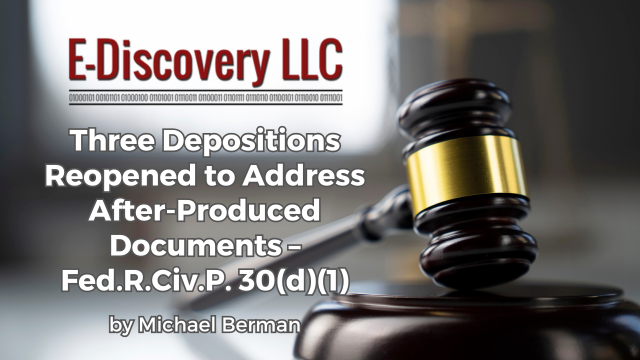
[EDRM Editor’s Note: The opinions and positions are those of Michael Berman.]
The standard for reopening completed depositions to address after-produced documents was explained in In re Sandisk SSDs Litigation, 2025 WL 2304805 (N.D. Cal. Aug. 11, 2025).
The court stated that: “Plaintiffs move to reopen fact discovery to reopen three depositions of Defendants’ employees in light of Defendants’ belated production of documents that Defendants had previously designated as privileged….”
It explained that: “There is no dispute that Defendants withdrew their privilege designations as to the vast majority of documents in dispute, and produced those documents after the witnesses at issue were deposed. Defendants also failed initially to provide a privilege log as required by Rule 26(b)(5) of the Federal Rules of Civil Procedure.”
However, defendants opposed reopening the depositions, asserting that the documents did not include “sufficient relevant information, not previously known to Plaintiffs, to warrant reopening….”
The Sandisk court did not accept defendants’ argument, stating:
But where Defendants have brought this situation on themselves by withholding documents from production without sufficient cause, the Court is not inclined to second guess Plaintiffs’ assessment of the potential relevance of the documents….
In re Sandisk SSDs Litigation, 2025 WL 2304805 (N.D. Cal. Aug. 11, 2025).
Importantly, the court added:
Defendants impeded these examinations by failing to produce documents subject to discovery prior to the depositions. The Court is inclined to grant Plaintiffs the opportunity they were previously denied to question the witnesses about those documents, at least some of which relate specifically to each of these witnesses.
Id.
Fed.R.Civ.P. 30(d)(1) generally provides that a deposition is limited to one day of 7 hours. However, the Sandisk court added that:
Under Rule 30 of the Federal Rules of Civil Procedure, “[t]he court must allow additional time [for depositions] consistent with Rule 26(b)(1) and (2) if needed to fairly examine the deponent or if the deponent, another person, or any other circumstance impedes or delays the examination.” Fed. R. Civ. P. 30(d)(1).
Id.
The Sandisk court made clear that its order was limited. It specifically prohibited a “complete do-over” of prior depositions, writing: “To that end, the reopened depositions shall be limited to questions pertaining to documents produced after the original deposition, questions pertaining to testimony from other witnesses’ reopened depositions, and reasonable follow-up questions to the witnesses’ responses to those questions.” It wrote that it might impose specific sanctions for violation of that limitation.
To that end, the reopened depositions shall be limited to questions pertaining to documents produced after the original deposition, questions pertaining to testimony from other witnesses’ reopened depositions, and reasonable follow-up questions to the witnesses’ responses to those questions.
In re Sandisk SSDs Litigation, 2025 WL 2304805 (N.D. Cal. Aug. 11, 2025).
The court also wrote: “It is not clear if any other documents were produced after these depositions beyond what was at issue in the parties’ disputes over Defendants’ privilege assertions. If other documents were also produced after the depositions, Plaintiffs may also ask about any such documents. Defendants may not be to blame for other document productions occurring after the depositions, but when the depositions will be reopened anyway to account for Defendants’ unwarranted privilege designations, it reasonable to allow Plaintiffs to also ask about other evidence that was not available to them at the time of the previous depositions.”
The court addressed a number of other issues, including instructions not to answer questions in the prior depositions.
Assisted by GAI and LLM Technologies per EDRM GAI and LLM Policy.


